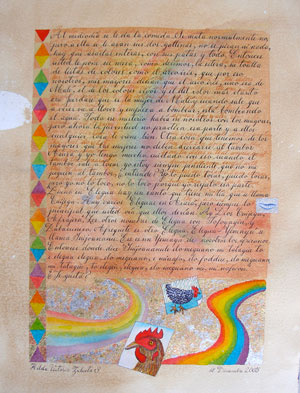Hilda 3

Sumi Ink, metal leaf, and watercolor on paper, 17" X 22"
Hilda Victoria Zulueta, December 18, 2005, Perico, Cuba
Si, al mediodía se le da la comida. Se mata normalmente no, pero a ella se le asan sus dos gallinas, no se pican ni nada, hay que asarlas enteras, con sus patas y todo. Entonces usted le pone su mesa, como decimos, la estera, su toalla de listas de colores como el arco iris, que por eso nosotros, mis mayores decían que el arco iris, uno era de Malé, el de los colores vivos y el del color más clarito era Juerdase que es la mujer de Malé y cuando sale que a veces va a llover y empieza a bombear, está bombeando el agua. Todo ese misterio había en nosotros con los mayores, pero ahora la juventud no practica esa parte y a ellos cualquier cosa le viene bien. Otra cosa que tenemos de los mayores que las mujeres no deben acercarse al tambor Arará y yo tengo mucho cuidado con eso cuando el tambor sale a tocar yo estoy siempre pendiente que no se me peguen al tambor, ¿entiende? Yo lo puedo tocar, pero yo no lo toco, yo no lo toco porque yo respeto esa parte. Bueno en Elegua hay un santo que tiene mi tía que se llama Cuijegá. Elegua Tofoyayin Babacuneco Afrequete es otro Elegua. Elegua-Yemayá se llama Guijoananu. Ese es un Yemayá de nosotros los africanos. Entonces donde dice 'Guijoananule elo meguano mi tatagüe to e elegua elegua, elo meguano, e minafo, elo foddue, elo meguano, mi tatagüe, to elegüe, elegua, elo meguano mi, mi nafwon'. ¿Te gustó?
Hilda: Yes, at noon she is given her food. Animals are usually killed, but for her, two hens are roasted, they are not plucked or anything, they must be roasted whole, with their feet and everything. Then you set the table, as we say, the placemat, her towel with stripes colored like the rainbow. One was for Malé, the one with the bright colored stripes like the rainbow. That is why we, my elders said that one rainbow belonged to Malé, and one with lighter colors was Juerdase, who is the wife of Malé, and when the rainbow comes out sometimes it is about to rain and it begins to pump, it is pumping water. All that mystery we had with the elders, but now, the young people don't practice that part. Anything is fine with them. Another thing the elders passed to us is that women must not come close to the Arará drum, and I am very careful about that. When the drums come out to play I am always watching not to be bumped by the drum, you understand? I can touch it, but I don't touch it because I respect that part. Well, in Eleggua my aunt has a saint that is called Cuijegá. Elegua Tofoyayin Babacuneco Afrequete is another Elegua. Elegua-Yemaya is called Guijoananu. That is a Yemaya that belongs to us, the Africans. Then, where it says 'Guijoananule elo meguano mi tatagüe to e elegua elegua, elo meguano, e minafo, elo foddue, elo meguano, mi tatagüe, to elegüe, elegua, elo meguano mi, mi nafwon'. Did you like it?









